The prophecy of the chosen one is considered to be a tired trope by many fantasy readers. Indeed, many books use prophecy as a crutch to make it easier on the characters and push the plot along. But when done well, prophecy makes it harder on the characters, not easier, and enhances the mythic quality of the novel.
I love prophecy and the tale of the chosen one. I love when I realize a new book will detail another hero’s journey, and I break out in goosebumps when the prophecy sends our hero forth. The Lord of the Rings teems with prophecy—most of the main characters have legends attached to them. Harry Potter’s entire dilemma would not exist if a prophet hadn’t spewed her ambiguous foretelling, setting Voldemort against him. When in the hands of a master, a prophecy can be devastating. It can wring the chosen one dry, even crushing her spirit and leaving her quest shrouded in doom. A prophecy can add a lyricism to the novel, which makes the writing sing. It cloaks a novel with a hint of ancient folklore. Before you give up on prophecy, read one of these five masterfully prophetic books.
The Dark Is Rising Sequence by Susan Cooper
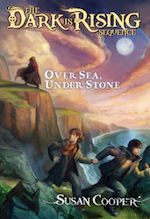 When the dark is rising, six shall turn it back;
When the dark is rising, six shall turn it back;
Three from the circle, three from the track;
Wood, bronze, iron; water, fire, stone;
Five will return, and one go alone…
This is the classic use of prophecy and is pure poetry, adding mystery and suspense to the series. The series is set in modern times but follows the Arthurian legends as evil emerges in our world. The first book, Over Sea, Under Stone, sets the stage for the prophecy. The next four books force characters Will, Jane, Barney, Simon, and Bran to use the prophecy to unravel the mystery of how to defeat the dark forces which rise against them. Always suspenseful, sometimes heartbreaking, this young adult series is one to reread again and again.
The Nightrunner series by Lynn Flewelling
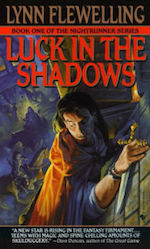 First shall be the Guardian, a vessel of light in the darkness. Then the Shaft and the Vanguard, who shall fail and not fail if the Guide, the Unseen One, goes forth. And last again shall be the Guardian, whose portion is bitter, bitter as gall.
First shall be the Guardian, a vessel of light in the darkness. Then the Shaft and the Vanguard, who shall fail and not fail if the Guide, the Unseen One, goes forth. And last again shall be the Guardian, whose portion is bitter, bitter as gall.
Flewelling is a master of the prophecy. Her prophecies are not kind, comfortable paths for her characters. They carry heartbreak and abandonment and cruelty. The Nightrunner series begins with the above prophecy, leading to shocking betrayal for Seregil and Alec. Does she leave her characters alone after they resolve the quest? Of course not—there is no escaping the bitter hand of prophecy in the kingdom of Skala. The next prophecy, given to Alec, tears apart the two lovers and creates a backdrop for the remaining series.
The Curse of Chalion by Lois McMaster Bujold
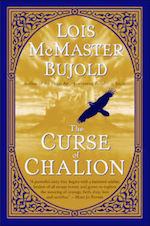 The curse will be lifted only through the will of a man who would lay down his life three times for the House of Chalion.
The curse will be lifted only through the will of a man who would lay down his life three times for the House of Chalion.
How can a man die three times? This question destroys the love of Royina Ista as she tries to save her family from the curse, and threatens to destroy the entire royal family if our hero Cazaril cannot plan and think his way to the answer. The follow-up novel, Paladin of Souls, follows Ista as she tries to rebuild her life after her failure to fulfill the prophecy on her own, desolate and abandoned by the gods she tried to serve.
The Black Jewels Trilogy by Anne Bishop
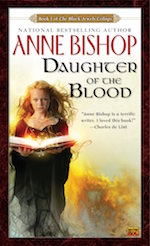 To paraphrase the prophet, Tersa: The day is coming that the debt will be called in, and the Blood will have to answer for what they’ve become. Witch is coming. The living myth, the dreams made flesh.
To paraphrase the prophet, Tersa: The day is coming that the debt will be called in, and the Blood will have to answer for what they’ve become. Witch is coming. The living myth, the dreams made flesh.
What happens when you are the chosen one that your own family hopes is never born? In this dark fantasy series, Bishop shows us. When Jaenelle is born, her own family does not recognize as Witch. Indeed her grandmother states in Jaenelle’s hearing that if Witch comes, “I would hope that someone would have the courage to strangle it in the cradle.” Jaenelle must undergo horrific abuse while hiding who she is and what she stands for so she can escape those who would control her and the darkness justice she conceals.
The Demon Cycle by Peter Brett
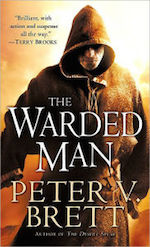 The demons have arisen and wards protect humans from utter destruction. The religion states that a Deliverer protected the people, until mankind turned their back on him. The prophecy states that the Deliverer will return to banish the demons “and lo, ye shall know the Deliverer, For he shall be marked upon his bare flesh…”
The demons have arisen and wards protect humans from utter destruction. The religion states that a Deliverer protected the people, until mankind turned their back on him. The prophecy states that the Deliverer will return to banish the demons “and lo, ye shall know the Deliverer, For he shall be marked upon his bare flesh…”
It’s easy—our hero Arlen is the Deliverer. He has the tattoos. Of course, he denies it, but he’s just modest. Right? But… who is this Jardir guy from the desert? And why does he seem stronger than Arlen? Wait, how can there be two Deliverers, especially if the two despise each other? And what if the two Deliverers end up killing each other? Who is going to deliver the people then? Oh, naughty, naughty Peter Brett, causing us to doubt and wonder which of his group of characters will really be able to deliver the people from the demons—if any. Brett shows that belief is more powerful than accuracy in naming the chosen one and fulfilling prophecy.
Are there books you particularly love the use of prophecy in, or is it just too tired a subject?
 Kelley Grant grew up in the hills of Ohio’s Amish country. Her best friends were the books she read, stories she created and the forest and fields that inspired her. She and her husband live on a wooded hilltop and are owned by five cats, a dog and numerous uninvited critters. Besides writing, Kelley teaches yoga and meditation, sings kirtan with her husband, and designs brochures and media. Her latest book, The World Weavers, is out May 31st from Harper Voyager.
Kelley Grant grew up in the hills of Ohio’s Amish country. Her best friends were the books she read, stories she created and the forest and fields that inspired her. She and her husband live on a wooded hilltop and are owned by five cats, a dog and numerous uninvited critters. Besides writing, Kelley teaches yoga and meditation, sings kirtan with her husband, and designs brochures and media. Her latest book, The World Weavers, is out May 31st from Harper Voyager.










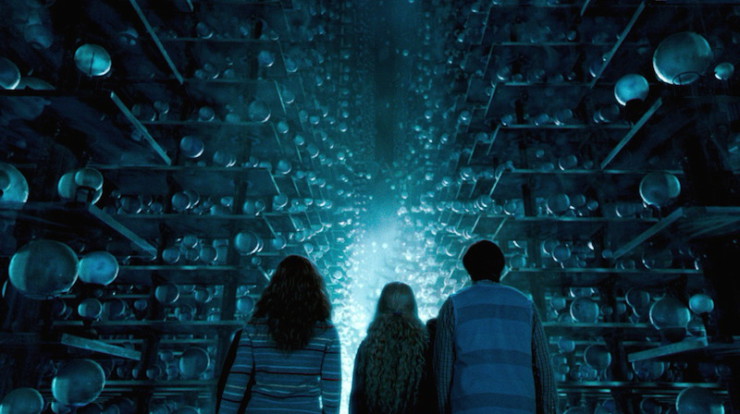
The Wheel of Time by Robert Jordan (and Brandon Sanderson) seems like a gross omission.
David Eddings’ Belgariad. Prophecy is a key to that series.
Thanks for reading my musings.
AndrewHB
As Iron Eyes @@@@@ 1) said, The Wheel of Time is a confusing omission.
Another omission would be the Dune series and Paul Atreides (Lisan al-Gaib, Mahdi, Kwisatz Haderach),
Seconding Wheel of Time/Dune, but Goodkind’s Sword of Truth series also has a lot to do with prophecy and the ‘mechanics’ of it all.
Oh, and Sanderson’s Mistborn series is a bit of an interesting twist on heroic prophecies.
Might be a stretch, but in some ways Lyra in His Dark Materials is prophecied to be the new Eve (although there weren’t really ‘prophets’ in that book).
Honestly, don’t MOST fantasy works end up being about prophecy, haha?
I’d argue that the Wheel of Time isn’t an omission at all (and definitely not confusing), because in Jordan’s hands prophecy was “a tired trope” and “a crutch”.
Lord Foul’s Bane and sequels, where Thomas Covenant fights prophecy every step of the way. Now, there’s brilliant use of prophecy.
I agree that Dune belongs, but it’s easy to overlook as we tend to think of prophecy as belonging to high fantasy, not SF. Though it’s integral to the Foundation series, too.
I generally hate prophecy. I hate it even more when it’s used in things that are nominally science fiction (predictions on the future based on probabilities, but not certainties, can be sometimes slide by, as can time travel but even that’s risky depending on how it’s done). There are always exceptions, of course, but I’m at a point in my life where if a prophecy pops up in something I’m reading or watching, my spirits instantly sink and the dislike begins to grow. Whoever’s writing it has to do it really well from that point on to win me back.
That said, one that did was Un Lun Dun by China Mieville, (targetted to younger readers but hey, so’s Harry Potter)… mostly because it completely inverts it. The “Chosen One” and her funny best friend are whisked away to a magical world to fulfill her part in the prophecy… but she’s taken out early on, and the best friend has to save the world on her own.
The two sets of Percy Jackson series by Riordan are centered on prophecies that are surprisingly well handled.
On a more mainstream note, how about GRRM’s ASOIF? 20 years of analysis and we still haven’t quite figured out all of the many prophesies from the House of the Undying sequence in ACOK.
I don’t think Dune is about a prophecy per se; the Bene Gesserit were not following a prophecy in trying to create the KH (no, I’m not going to look it up), rather, they were trying to take control of mankind’s destiny by making one.
Re Dune – Fremen had their own prophecies that proved accurate. Their savior would be an offworlder who know their ways. etc. The interesting question is whether the BG “seeded” Arrakis with these prophesies to protect future BGs living on planet (as Jessica tried to do when first facing the Fremen – using code words to feed into likely prophecies) and they coincidentially proved to be correct or were they actually based on actual prophecies.
Kevin Hearne’s “Iron Druid” series has an interesting use of prophecy followed by a more pedestrian use.
In it, it turns out the Sirens from The Odyssey weren’t singers. They were prophets who spoke true things intended to drive men mad, demanding to know what they meant, thus being lured to their deaths on the rocks. Book nine of the series (when it finally comes out) will resolve a particularly nasty prophecy which was told to Odysseus, who then told it to the Iron Druid at some point in the past, which means the Sirens told Odysseus knowing that he would tell the druid. The prophecy is going to be 100% accurate but interpretation, as always, is the key. Later, that mind-blower was followed by divination used for the sole purpose of locating an enemy. *yawn*
Prophecy is so very hard to use well in stories.
Do the Hunter Kiss novels by Marjorie M Liu count?
Hunter Kiss Series
The Hunter Kiss series is about the last living demon hunter on earth — a woman covered in living tattoos that peel off her body at night to form her own personal demonic army — an army that is her only family, dedicated to saving her life — and destined to end it.
The Raven King’s prophecy in Jonathan Strange and Mr Norrell is the best prophecy, or at least the most poetic.
Magic shall be written upon the sky by the rain but they shall not be able to read it;
Magic shall be written on the faces of the stony hills but their minds shall not be able to contain it;
In winter the barren trees shall be a black writing but they shall not understand it.
Two magicians shall appear in England…
I sit upon a black throne in the shadows but they shall not see me.
The rain shall make a door for me and I shall pass through it;
The stones shall make a throne for me and I shall sit upon it.
The nameless slave shall wear a silver crown,
The nameless slave shall be a king in a strange country.
And it all comes true, too.
Jean Johnson’s Theirs Not to Reason Why series uses prophecy quite a bit. The main character can see into the future and uses that ability to save the future.
Yes. The Belgariad / Malloreon cycles and ASOIAF, with all that stuff in the warlock’s temple.
“Twice and twice shall he be marked,
twice to live and twice to die …”
Obviously, I’m on board with everybody suggesting WoT here, took only a second into the article to think of it. Almost as quickly came the Mistborn series and ASOIAF (strong supporter of the Jon = Azor Ahai theory). Also, I might be wrong, but did not Brandon also hint somebody will be the champion of the KRs in the Stormlight Archive? Because I remember thinking that this must be Kal.
For some reason, I also seem to come back to to Lindgren’s “Mio, My Son” so often – according to a prophesy thousands of years old, Mio is destined to ride alone with only one friend through the dark forest to challenge the evil knight kidnapping the children.
Well I mentioned David Gemmell like twenty minutes ago on the last one of these, but he had two really good series where prophecy played a part in a bigger whole. The second half of the Rigante series (Ravenheart and Stormrider) involved a Knights Templar-esque group going on a holy war spurred mainly by a prophecy. Spoilers: the prophecy is misunderstood and the leader upon seeing his imminent death realizes that his own actions in misinterpreting the prophecy led him to his own demise.
Also the Waylander trilogy is tied together loosely by a prophecy about when the Tortured Antihero Assassin guy will finally be at peace. Despite the obvious trope, the final ending is incredibly moving when the prophecy is understood.
I think the main thing is that these weren’t the entire crux of the story. They just played a bit part and colored the endings a little differently, not so much being a contrived ending for the sake of the side of Good.
I really enjoyed J V Jones’s Book of Words series. The prophecy didn’t really make life easier for the protagonist, and it was used in a couple of interesting ways. It might be considered a little tired now, but I still enjoy the series.
What a nice surprise! Thank you. :)
Lynn
Good Omens?
Job: A Comedy of Justice?
The Redemption of Althalus?
All three turn prophecy on its head.
In Cordwainer Smith’s Norstrilia, there’s a prophecy from the rat, the Copt and the robot, about the future redeemer of the underpeople, who does not eventuate, much to E’lamelanie’s disappointment and sorrow. And in The Weirdstone of Bringamen, there are prophecies left-right-and-centre, but only one need concern the people in the story, the one sung by the stromkarl on Goldenstone when the two kids and the two dwarfs win free of the mines.
When Adam’s flesh and Adam’s bone
sits in Cair Paravel enthroned…
just saying. Also, huge YES to the omission of Percy Jackson, each book of which holds prophecy as its backbone.
How about Sara Douglass – The Axis Trilogy & Wayfarer Redemption series.
The prophecy guides the characters in their endeavors, but also holds surprises for the characters that have far reaching effects. It is wonderfully written.
A day will come when born will be ,Two babes whose blood will tie them.
That born to Wing and Horn will hate, The one they call the StarMan.
Destroyer! rises in the north, And drives his Ghostmen south;
Defenceless lie both flesh and field, Before Gorgrael’s ice.
To meet this threat you must release, The StarMan from his lies,
Revive Tencendor, fast and sure, Forget the ancient war,
For if Plough, Wing and Horn can’t find, The bridge to understanding,
Then will Gorgrael earn his name, And bring Destruction hither.
StarMan, listen, heed me well, Your power will destroy you
If you should wield it in the fray, ‘Ere these prophecies are met:
The Sentinels will walk abroad, ‘Til power corrupt their hearts;
A child will turn her head and cry, Revealing ancient arts;
A wife will hold in joy at night, The slayer of her husband;
Age-old souls, long in cribs, Will sing o’er mortal land;
The remade dead, fat with child, Will birth abomination;
A darker power will prove to be, The father of salvation.
Then waters will release bright eyes, To form the Rainbow Sceptre.
StarMan, listen, for I know, That you can wield the sceptre
To bring Gorgrael to his knees, And break the ice asunder.
But even with the power in hand, Your pathway is not sure:
A Traitor from within your camp, Will seek and plot to harm you;
Let not your Lover’s pain distract, For this will mean your death;
Destroyer’s might lies in his hate, Yet you must never follow;
Forgiveness is the thing assured, To save Tencendor’s soul.
@13 Ventifer: “Jean Johnson’s Theirs Not to Reason Why series uses prophecy quite a bit.”
Her entire Sons of Destiny series is also based on prophecy — more than one such, in fact. So do the tie-ins set in the same world.
It might be argued that in those books, it is used entirely to speed the plot along and ease the way for the characters. Buuuut that is also a trope of the Romance genre, so it’s hardly surprising.
People keep talking about stuff being omitted? Seriously there is 5 books/series represented! You can only have so many books in a 5 book list.
Le Guin’s The Left Hand of Darkness is another sci fi book with prophesy in it. There is a not-exactly-religious group on the planet Gethen that prophesies in order to demonstrate the uselessness of prophesy. The envoy from the Ekumen, the galactic alliance, asks if Gethen will in the end join the Ekumen, expecting to get some obscure metaphorical response that could mean anything and is surprised to get the unambiguous answer ‘yes’. Knowing this tells him nothing about how it will happen, nor prepares him for what it will cost him.
Curse of Chalion: can’t recommend it enough. The fact that it and Susan Cooper are on this list make me want to check out some of the other suggestions. Thanks!
Regarding some of the recommendations in the comments:
I enjoyed Eddings’s Belgariad well enough when I was young, and the prophecy was interesting: the enemy had their own prophecy, so in effect it was a war between two prophecies. Neat. But the fact that people sometimes could converse with prophecies directly didn’t work IMHO, and Eddings compounded that problem in the Mallorean. Instead of an ambiguous prophecy driving, inspiring, or frustrating the characters, the prophecy literally would pipe up and announce what they had to do next. “Don’t do X like a reasonable person would, you must do Y, otherwise you will lose the final battle, for reasons.” My least favorite use of prophecy in a book, ever.
Robert Jordan did some interesting things with prophecy. Not only did the bad guys sometimes have a different prophecy, there were fanatics misinterpreting prophecies, and people cynically exploiting others’ belief in a prophecy.. In short, his people reacted in diverse and realistic ways to a prophecy, instead of being unnaturally informed or unified by it.
The original Mistborn trilogy (esp #2) did indeed mix up the prophecy formula in an interesting way, and I wouldn’t dream of saying more.
Tow that I didn’t see mentioned:
Harry Potter books had a prophecy of course, one which might have started to come true only because one character chose to believe in it. Rowling didn’t invent that idea of course, but I thought she used it well.
I was fond of Lloyd Alexander’s oracular pig in his Chronicles of Prydain. I don’t recall the prophecies specifically but I think they were straightforward and not too annoying: used for foreshadowing and so vague that they merely confirmed after the fact that a character had done something important.
So yes prophecies can be done poorly, tritely, or used as a crutch, but they aren’t a dealbreaker for me. They can be done competently even without a fancy new gimmick or twist.
ROT13 because this is an incredible spoiler: GURNHGUBEFANZRVFGVZCENGG
I recall a novel where one character does everything in accordance with what his pet oracle recommended, and things keep going wrong for him. Finally, at the end, when his empire is crumbling, he turns to his assistant and says “I don’t understand it! The prophesy said I should do ABC, and avoid XYZ, and that’s what I did!”
and his assistant says
“Uh, yeah. That… wasn’t actually a prophesy.”
“…what?”
“I gave the oracle a big bag of cookies and told him what to say. I figured it’d be more interesting like this. On the bright side, I draw my power from chaos energy, so with everything collapsing around us, now I’m strong enough to kill you and claim it was self-defense!”
Let’s not forget the classic misreading of prophecy that is the Witch King of Angmar’s supposed immunity to Men in RotK.
As far as turnabouts go his error is up there with Croesus of Lydia’s Delphic oopsie.
Forgot to mention everybody’s favorite woodland creatures…
“I, am that is, take on my mighty role…”
“…mixed up letters evergreen…”
I am surprised nobody mentioned “Memory, Sorrow, and Thorn” by Tad Williams which uses prophecy in a way no other does.
SPOILER
The prophecy is for the bad guys but the good guys think it is for them.
The Fellowship of the Three. Three books by Elizabeth Haydon: Rhapsody, Prophecy and Destiny.
The Prophecy of the Three :
The Three shall come, leaving early, arriving late,
The lifestages of all men:
Child of Blood, Child of Earth, Child of Sky
I think a defining difference between genre SF and genre fantasy is that in SF there may or may not be prophesies, but if there are they tend to be of the sort that has the protagonist rounded up by priests who want a sacrifice for their religion (e.g. Zelazny’s many examples). In fantasy prophesies always come about. The protagonist is usually written to struggle against being a part of that prophesy, until just before the end. (By this definition Dune becomes fantasy, right?)
I figure the reason why Wheel of Time is not included in the OP’s list is because there prophesy is a very standard plot device. Jordan didn’t attempt to subvert the notion of prophesy at all.
“The Chronicles of Prydain” by Lloyd Alexander are prophecy drive, and it’s not only the main theme but woven thru several secondary threads as well.
@27 and @35, I think it’s interesting that in Prydain, the main prophecy that drives Dallben’s, Coll’s, and Gwydion’s treatment of Taran isn’t even revealed until the end, and the other big prophecy Hen-Wen makes destroys her ability to communicate her prophecies and has to be guessed at by Dallben. The book that might reveal how that prophecy plays out is physically dangerous and constantly referred to as unreliable. For most of the series Hen-Wen is just called an oracular pig, but neither Taran nor the reader has ever seen her predict anything. The only prophecy we know anything about before it is fulfilled (if I’m remembering correctly) is the one written on the sword Dyrnwyn, and even that is treated as more of an admonition (and a mistranslated one at that) than an actual prophecy.
Also, I hate to be a naysayer, but as much as I love Susan Cooper’s series, in the second book (The Dark is Rising) the prophecy seems to be little more than a plot outline. There’s not much suspense in the story because events follow the words so exactly. The only question is the mechanics of how each situation will be resolved, and Will’s future or fortunes never really seem to be in doubt. It is classic, but it’s not unusual. It’s ageless people clinging to prophecy, claiming not to understand it, but ultimately always having a deus ex machina to make the prophecy work out. The rest of the series is better, but that book in particular, while having many other admirable qualities, feels kind of forced to me on the prophecy point.
@36, that’s one of the things I like about it… Imagine the “Harry Potter” books if Harry had never heard the prophecy. And a major point there was Snape only hearing part of it. So hidden prophecies can be the best. :)
Is this not prophecy based?
“Three Rings for the Elven-kings under the sky,
Seven for the Dwarf-lords in their halls of stone,
Nine for Mortal Men doomed to die,
One for the Dark Lord on his dark throne
In the Land of Mordor where the Shadows lie.
One Ring to rule them all, One Ring to find them,
One Ring to bring them all and in the darkness bind them
In the Land of Mordor where the Shadows lie.“